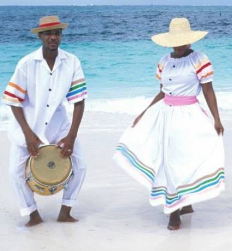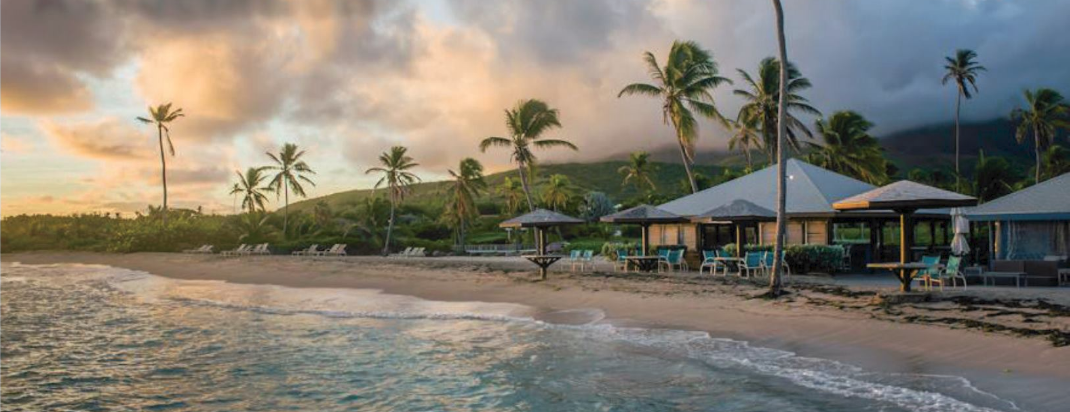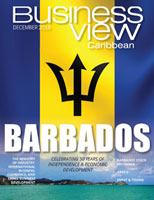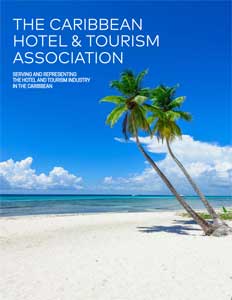The Caribbean Hotel and Tourism Association
Serving and representing the hotel and tourism industry in the Caribbean region.
Business View Caribbean profiles The Caribbean Hotel and Tourism Association,serving and representing the hotel and tourism industry in the Caribbean region
Recently, Business View Caribbean talked with Frank Comito, the CEO and Director General of the Caribbean Hotel and Tourism Association (CHTA). The following is a transcript of a wide-ranging discussion that touched on many issues and activities in which the Association is engaged:
 BVM: Can you give me some background on the history of the Association and how it may have changed and grown over the years?
BVM: Can you give me some background on the history of the Association and how it may have changed and grown over the years?
“The Caribbean Hotel and Tourism Association was originally called the Caribbean Hotel Association. It was founded in 1962, as part of a federation of national hotel and tourism associations in the region at that time. And we continue, to this day, being a federation of 32 national hotel and tourism associations with all of our respective memberships drawing from that number, as well as company members we garner from international sources. We have over 1,000 members today. It was founded, originally, to help market the industry and to work collaboratively on issues that affect its ability to drum up business. So a lot of its emphasis, in the early stages, was on marketing. But as time evolved, in the late ‘70s, ‘80s, and early ‘90s, its mission expanded into other areas, in particular: advocacy, research and information dissemination, workforce development, and overall product development. And that expanded mission continues to today.
“About ten years ago, the Caribbean Hotel Association changed its name to the Caribbean Hotel and Tourism Association, in recognition of our diverse membership and the broad reach that tourism has on the economies of the Caribbean. Over the years, we’ve also established a few related organizations and institutions, including the CHTA Education Foundation, which has awarded over $5 million worth of scholarships to the region’s residents and has played an integral part in human resource development. We also established a group called the Caribbean Society of Hotel Association Executives, which is geared towards supporting the professional development and the coordination amongst the various national hotel association executives – information sharing, best practices, and strengthening the two-way links between the national hotel and tourism associations and CHTA. We also had a spin-off organization called the Caribbean Alliance for Sustainable Tourism in the late 1990s, which focuses primarily on encouraging sustainable tourism practices. It’s the umbrella for energy efficiency projects that we’ve done, energy efficiency policies that we’ve advanced, best practices on environmental standards, and a range of sustainable initiatives.”
Can you elaborate on the Association’s advocacy responsibilities and activities?
“It’s an ongoing challenge to make sure that our policies regionally, as well as in individual countries, are conducive to advancing the growth, development, and profitability of the industry, and recognizing that it’s the primary generator of employment and tax revenue for the region. That’s not necessarily fully acknowledged in practice by many governments in the region, and we’ve worked hard with our counterpart organization, the Caribbean Tourism Organization, which represents government interests in the tourism industry, to provide information and facts about its economic impact. We’ve worked closely over the years with the World Travel and Tourism Council and groups like Oxford Economics to garner and support the development of the necessary research to show the broad economic impact of tourism in our various jurisdictions in the Caribbean. That’s been absolutely necessary because we’re faced constantly with issues of high taxation and high costs of doing business in the Caribbean, which have corresponding effects on our rates and our profitability. We have to be on top of that all of the time and work hard to make sure governments are aware of how policies and regulatory matters affect our industry and their economies. So, advocacy plays a very key role in everything that we do. We operate under seven guiding strategy objectives and right in there is advocacy and representation.”
You also mentioned research and the dissemination of information as part of the Association’s mission. Any recent initiatives in that area?
“We’ve done research and position papers on the lifting of the U.S. embargo on Cuba and offered some positive and constructive ways in which individual jurisdictions in the region can address the impending changes. We’re finalizing an advocacy paper, right now, on the sharing economy – groups like Uber and AirBnB – and how they may be effectively integrated into the industry with standards, regulations, and some fair play on taxation, to not only protect the reputation of the industry, but also to help to develop that subsector of the accommodations sector, as well.
The Zika virus has been in the news lately and it’s realistic to think that it will have an impact on travel and tourism in the region. How has the Association responded?
Early in 2016 CHTA quickly put into gear a multi-pronged approach toward addressing the Zika matter. It’s been a coordinated effort, a partnership between the public and private sectors, working in collaboration with the regional umbrella group, called CARPHA, the Caribbean Public Health Agency organization that represents ministries of health throughout the Caribbean. We’ve been working diligently on education, training, getting the right kind of information out there – mitigation and effective control techniques – and looking at it not only from the hotel and tourism industry’s point of view, but looking at it as an essential broader collaborative response by governments, communities, and our industry in the private sector, in dealing with a matter that, if it’s not handled as well as it could, might have broad consequences on our economies and our industry, and, quite frankly, the social health and welfare of the residents of the Caribbean. To date we’ve seen an overwhelming positive response and the industry has quickly responded with stepped up vector controls, staff training, and public education efforts aimed at guests and employees.
Can you talk a little about the nuts and bolts of the Association? Who are your members and are their different tiers of membership?
We’re a federation of national hotel and tourism associations, so the region’s national hotel and tourism associations are members. We also have over 600 hotel members from the Caribbean and another 400 allied members, both within the Caribbean as well as external partners – tour operators, wholesalers, airlines, people who do business with the tourism industry, even banks and other kinds of financial institutions. We also have what we call partner organizations that we work with like the Florida-Caribbean Cruise Association; the Caribbean and Central American Action, based out of Washington; the Caribbean Council, based out of the United Kingdom; and IATA, the International Air Transport Association. So we have a number of affiliated memberships, which are really reciprocal memberships – there’s quite a few of those.
What kind of events do you hold for your members?
“We have four key events throughout the year. We just completed our annual marketing event called Caribbean Travel Marketplace, which was held in The Bahamas and had over a thousand participants. That’s the industry’s premier business gathering where we bring suppliers– suppliers being the hotels throughout the region, some of the local tour operators, attractions, and providers – together with buyers, which include, primarily, leading tour operators and wholesalers from around the world, for two days of intense appointments for buying, selling, negotiating, making new contacts, and so on. We have an education component layered in that’s very much directed to sales and marketing kinds of training and support, and this year, we also had 14 ministers or heads of tourism in governments throughout the Caribbean join us. So, that’s the primary event.
“We also do an event called CHIEF, the Caribbean Hospitality Industry Exchange Forum, which is very much professional development and education-oriented. We started that event last October at the El Conquistador Waldorf Astoria in Puerto Rico and it was very successful – the feedback was terrific. In that, we have household names from every kind of company imaginable doing workshops and seminars for our people, and a buying element for our allied members with a tradeshow component to it. We’ll be repeating that again, this year, in the same location, the first couple of days in October.
“We also do an event called “Taste of the  Caribbean.” We’ve been doing that for over 20 years. It’s held in Miami and is a combination of a couple of things, including a competitive culinary event for the chefs. We have chefs from national teams throughout the Caribbean who come together for three days of intense competition for the rights of calling themselves the Caribbean Culinary Team of the Year, the Chef of the Year, the Pastry Chef of the Year, the Bartender of the Year. It follows international standards in judging and there’s a range of awards that are offered. Woven around that event are several other related events, showcasing culinary and cultural aspects of the Caribbean. We have education sessions for professional development for chefs, and food and beverage managers, and other personnel in the F & B industry. And we also have a consumer component, where the public’s invited, called “Taste of the Islands.” It’s a Caribbean tapas event with music and festive atmosphere. We have various countries throughout the Caribbean showcasing some of their best, national dishes.
Caribbean.” We’ve been doing that for over 20 years. It’s held in Miami and is a combination of a couple of things, including a competitive culinary event for the chefs. We have chefs from national teams throughout the Caribbean who come together for three days of intense competition for the rights of calling themselves the Caribbean Culinary Team of the Year, the Chef of the Year, the Pastry Chef of the Year, the Bartender of the Year. It follows international standards in judging and there’s a range of awards that are offered. Woven around that event are several other related events, showcasing culinary and cultural aspects of the Caribbean. We have education sessions for professional development for chefs, and food and beverage managers, and other personnel in the F & B industry. And we also have a consumer component, where the public’s invited, called “Taste of the Islands.” It’s a Caribbean tapas event with music and festive atmosphere. We have various countries throughout the Caribbean showcasing some of their best, national dishes.
“The fourth signature event that we have is the Caribbean Hotel Investment Conference and Operations Summit that’s held in November. That’s done primarily by a company called HVS and we, along with the Caribbean Tourism Organization, are host sponsors, as well. Those make up the bulk of our major activities and events.”
How else do you communicate with the membership?
“We communicate with them about four or five times a week. We try to balance it so we don’t over-communicate, but we have various ways. We do webinars, email, and social media. At our Caribbean Travel Marketplace, we had over nine million social media hits on that event; it was quite exciting to see that kind of engagement.”
The Great Recession harmed tourism pretty much everywhere, but particularly in the Caribbean. What does the landscape look like for the industry over the next several years, and how do you see the Association continuing to be a viable voice for the sector?
“We just completed our first annual ‘Industry Performance and Outlook Study.’ The findings really showed that we’re continuing on an upward path that started about three years ago for the region as an aggregate. Some destinations did okay during the Recession, some struggled quite a bit, and some came out of it earlier than others. Collectively, the region really came out of it about three years ago, and we’ve seen a good upward trend line. More than half the hotels reported strong to moderate performance in 2015. With increased occupancies and arrivals, most hotels also increased their employment rolls. So there was some robust hiring, last year.
“Also, one of the things that happened during the Recession is we saw a retrenchment in capital expenditures. We’re starting to see people coming out of that, and last year, they came out of it quite significantly. So, capital expenditures and investments in hotel properties were up, last year, and are projected to increase in 2016. The profit picture is a little unsettling, yet, in part because of people still struggling. There are a lot of back payments and things that were put on hold. And because of the Recession, we were not able to move up our ADR, our Average Daily Rate, as quickly as we wanted to as an industry, but we’ve been seeing it move up four to six points each year over the last two years. Despite improved performance, one third of the hotels reported an anticipated loss in 2015. That’s not insignificant, but at the height of the Recession over half of them were reporting that. So we’ve seen some change, that way.
“90 percent of the hotels characterized the 2015 tourism industry as ‘strong to moderate.’ And the outlook for 2016 remains positive with some concerns. The outlook wasn’t as strong as 2015, but it’s still strong. We asked a few questions about those concerns and received comments that categorized a couple of areas – high operating costs, taxation pressures, air lift challenges, and, to a lesser extent, perceptions of crime and safety in the region.”
You mentioned “air lift challenges.” Are you alluding to the fact that air travel to the island is still too expensive for many people?
We’ve not engaged some our key people, including the airline stakeholders, as effectively in recent years. So, part of the mandate we’ve given ourselves is to reach out to them much more effectively and we’re doing that, right now. We’ve done some research on price elasticity and at one point we lose market share because of the high cost of airfare. So, one of our goals around advocacy is to reduce the high cost of airfare. One of the major contributors to the high airfare costs to the Caribbean are the high tax levels. Taxes and fees have gone up incredibly in the last several years. The U.S. taxes and fees have pretty much held their own, but, for example, if you buy a ticket to the Bahamas, which is a quick hop from Florida, over 51 percent of the cost of your ticket are taxes and fees. And that translates into most jurisdictions in the Caribbean – they can be quite high. So, when you factor that in, our argument has been that that adds to the increased costs of supply. The airlines’ cost have actually held their own or gone down a bit, but it’s the taxes and fees that are the big bugaboo, here. So, we started an outreach, working with our Caribbean Tourist Organization, to look at ways we can help to reduce the cost of travel to the region. It’s an advocacy initiative that’s part of a three-year plan. We won’t get it done overnight, but we have done a lot of groundwork, already; we’ve built some collaborative efforts around it both with the airline industry and with the Caribbean Tourism Organization to help address, not only the costs, but also the ease of travel, as well. It should be much easier than it is.
To sum up, what are some of the salient points that you would like our readers to take away from an article about the CHTA?
“The core of the message is that in the Caribbean, tourism is everyone’s business. And if people understand better the connection of how it affects everything – the socioeconomic aspect of everything in almost all the destinations in the Caribbean – they can see how we can better connect the dots. We need much more friendly policies and collaborative initiatives to protect and enhance the industry. It’s the single quickest way to generate employment and tax revenue for the governments of the Caribbean. Bumping up our arrivals and our occupancies a few points has tremendous value; the tourist dollar has a multiplier effect that touches just about every aspect of life. And the Caribbean Hotel and Tourism Association is an active and engaging partner, working at the local and regional levels to help market, develop, enhance, and protect the industry.”
Check out this handpicked feature on the Caribbean Tourism Organization.
AT A GLANCE
WHO: The Caribbean Hotel and Tourism Association
WHAT: Serving and representing the hotel and tourism industry in the Caribbean region
WHERE: Coral Gables, Florida, USA
WEBSITE: www.caribbeanhotelassociation.com



